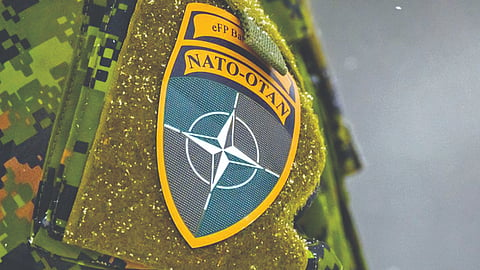

Since Ukraine’s Maidan protest movement and the annexation of Crimea in 2014, Russia has tried to influence public opinion with targeted disinformation campaigns. While the extent of these efforts both at home and abroad has been hard to quantify since Russia’s full-scale invasion of Ukraine nearly one year ago, experts tell DW that their intensity and scope have increased. One narrative, begun even before the war, has been particularly persistent: That the North Atlantic Treaty Organization (NATO) — the 30-member European and North American military alliance established after World War II — is not only threatening Russia, but may even wish to invade it.
Long before the invasion of Ukraine in February 2022, experts said that Russia spread such stories to justify the war. “I would say that we probably could start this [the false claims] from the Maidan revolution in 2014. Since then, Russians have been claiming that the West is meddling with Ukraine,” said Roman Osadchuk, a research associate at the Atlantic Council, an international affairs think tank based in the United States.
In many Russian narratives, cause and effect are inverted, said Lutz Güllner, head of strategic communications at the EU’s diplomatic service, the European External Action Service. “It’s always about portraying how much Russia is actually threatened, is under siege, is threatened by Ukraine, and therefore must defend itself, making the war nothing more than deterrence.” For example, in a televised address a few days before the invasion, Russian President Vladimir Putin claimed that NATO was “expanding more and more,” with its military infrastructure encroaching upon the country’s borders.
There is some truth to this. Since the collapse of the Soviet Union, 14 Eastern European countries have joined NATO, four of them bordering Russia. Ukraine requested the chance to join via NATO’s Membership Action Plan in 2008, and the country’s initiative to join has only intensified since Russia’s invasion.
It is also true that NATO has made logistical preparations in its Eastern European member states, in addition to preparing airfields for the rapid reinforcement of troops. However, this was also in response to Russia’s annexation of Crimea in 2014, which was illegal under international law. The NATO alliance continues to respect the 1997 NATO-Russia Founding Act, which prohibits the additional permanent deployment of substantial combat forces in NATO accession countries. But that has not deterred Putin from his claim that NATO is threatening Russia.
Putin has also alleged that Ukrainians have perpetrated genocide against Russian-speaking people in the illegally annexed “republics” of Donetsk and Luhansk for years, and that these areas must be “denazified.”
Such false claims have been aimed primarily at a domestic audience. But the narrative has also had some impact in the West.
In an October 2022 study by the Germany-based Center for Monitoring, Analysis and Strategy, 19% of respondents in Germany agreed with the statement that Russia’s war of aggression against Ukraine was an unavoidable response to NATO provocation. Some 21% partially agreed with this statement. That makes 40% of Germans who at least partially believe NATO is at fault in the Ukraine conflict.
“That’s a pretty high number, and that’s presumably a result of both disinformation campaigns and existing beliefs and attitudes toward NATO,” said Julia Smirnova, senior analyst at the London-based Institute for Strategic Dialogue, which has also been studying the spread of disinformation during the war.
Visit news.dtnext.in to explore our interactive epaper!
Download the DT Next app for more exciting features!
Click here for iOS
Click here for Android